|
Chapter III
The Boulton girls were growing up in a time of social
revolution. They had been raised in the strict, confining Victorian era
and now the new century had brought with it a complete turn-around in
thought and behavior. These young women were being swept into a
challenging time. Their peers went on marches to Washington to pressure
Congress into passing a bill so they might have the right to vote. They
were watching Alice Paul who was deeply involved in this struggle and
who became a leading figure in the passage of the 19th Amendment for
women's suffrage.
Young ladies changed their dress styles from the
confining and binding long skirts with tight bodices to short skirts
with fringes that twirled as they danced. They valiantly tried breaking
out of their emotional and political chains. Free love was a part of the
changing scene. Dancing, drinking and smoking were the style for many,
but it was a revolution some of the young women were little prepared to
handle. Not wanting to be involved, the more reluctant ones clucked
their tongues, but numbers of the more daring young women took up their
banners and marched with the change.
Agnes and her sisters had grown up in an artist’s family
with a mother who quietly presented rather avant-garde ideas, but still
they were not totally able to accept this new scene as they moved with
the times into city life. Again, they were trying.
Young Agnes Boulton was the first to find a room where
she could live and work in New York City. West Point Pleasant was only
an hour away by train and so an easy trip home to the family. Aggie had
grown into a tall, beautiful woman, shy but with an air of independence,
and thoroughly enjoyed the freedom of being on her own.
City life, as Agnes found it, was charged with a new
energy and the hustle-bustle of young people finding their way into the
working world. Jazz had wound its way up from New Orleans and was coming
into its own in the North. Women, as well as men, went into smoke-filled
bars to listen to the new music, drink, and to philosophize.
Greenwich Village had taken on an arty mode with long
haired men and short haired women cramming into clubs to hear prose and
poetry readings of the day, with candles lighting the small stages.
Agnes became involved with new friends, many of whom lived a Bohemian
lifestyle, and she found herself caught up in the midst of it all.
At twenty-one, Agnes suddenly announced to the family in
New Jersey that she was going to England to visit her grandmother and
some of the Williams family. A few months after she had made the trip, a
letter came from England addressed to her mother.
Cecil read the letter carefully. Agnes said she didn’t
know where to begin her story. She wrote about a man she had met over
there with whom she had fallen in love. They had decided to get married,
but she wasn’t certain whether or not they would get back to the States
for a time. She would let the family know, and hoped Teddy wouldn’t be
upset.
Cecil didn’t tell Ted or talk about it to anyone right
away, and she decided to let a little time go by. Before long Agnes had
sent a telegram stating she would be home in a few weeks. Aggie arrived
home and told her mother she was pregnant. She seemed sad and had a
difficult time talking about what happened. The story she told was that
she had married an army man named Burton, and shortly after this, she
said, he was killed in an accident. Agnes was obviously depressed and
seemed reluctant to go into any details. Perhaps someday the entire
story would come out, but Cecil was not going to push her distraught
daughter.
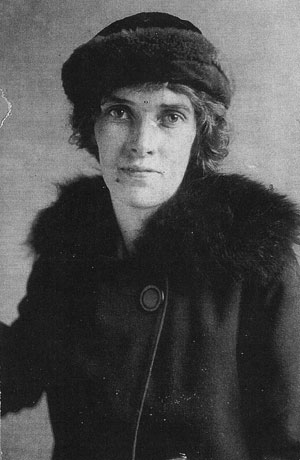 |
Agnes
Boulton Burton, 1917. Courtesy of Maura O'Neill Jones. |
Agnes described Burton as having left enough money for
her to return to the States and be able to buy a place of her own where
she could live and raise her child. Cecil wondered, “Was there really a
man named Burton? And where did the money really come from?”
Agnes told her mother, “ I would like to live in
northern Connecticut where I can try some simple farming, raise a garden
and have a few cows. Then I’ll be able to stay with the baby when he or
she arrives.” Having tried it with her own mother, Cecil thought to
herself, “There’s no such thing as simple farming!”
Cecil’s head whirled as she realized she might be
helpful by staying for awhile with Agnes after she bought the house. She
could be there until Agnes was settled in and the baby arrived. Agnes
seemed frightened by what lay ahead.
Ted would be fine staying in Jersey with the family and
animals. The younger girls would help him to keep things going, and
Granny, Cecil’s mother, who had returned again from England, would be
there for the time being. Cecil pondered the whole crazy story, knowing
the important thing was to get Agnes settled in somewhere.
Agnes left Jersey in the late spring and told the family
she had found an old farm in Cornwall Bridge, Connecticut. This would be
practical because there was a daily train running in and out of New
York, which meant she would be able to go down once in awhile and take
her work to various publishers who knew her abilities. She was feeling
encouraged about the whole situation.
Walking from the train station in Cornwall up to the top of the hill and
on to the old farmhouse, took Agnes some time, but she enjoyed the trek.
It was a new adventure. The house was close to the road with barns
behind and enough acreage to accomplish all she had planned. Because of
the glorious sunrises, she named the place Dawn Hill, symbolic of the
beginning of a new life.
| Agnes at
Dawn Hill, Cornwall, Connecticut, 1913-1914. |
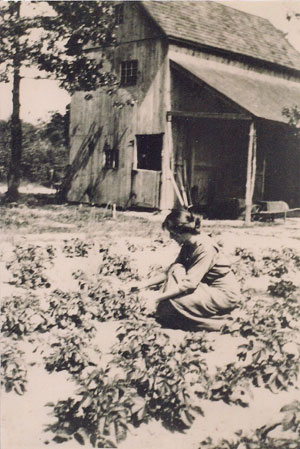 |
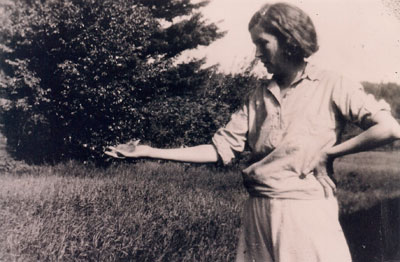 |
When the time came for the baby to be born, mother Cecil
left Jersey and took a train to New York and then to Connecticut and
stayed with Agnes until the baby arrived. It was perfect June weather
and the summer was ideal.
Ted and the family in New Jersey were notified when
little Barbara was born. It was June 20, 1914. Cecil had explained the
situation to the family before she went up to Cornwall and no one, not
even Ted, had been distressed about it. A letter to Point Pleasant was
cheerful and encouraging, with Cecil telling the family she had
delivered her first grandchild.
Dear Lovits,
The baby is here! She is a darling little girl.
Aggie is naming her Barbara…for you, Bob! (sister Barbara). The place here is lovely just now,
and I
helped Aggie put in her garden a few weeks ago. She is doing well
and
the baby is healthy and peaceful. I’ll stay awhile longer until
Aggie is on
her feet and feels all right being alone.
Now that I’m a grandmother, I want my grandchildren
to call me
Nanna! Thanks for all the letters. I miss everyone and hope perhaps
you’ll be up sometime during the next month. Love to all, Mother…Nanna
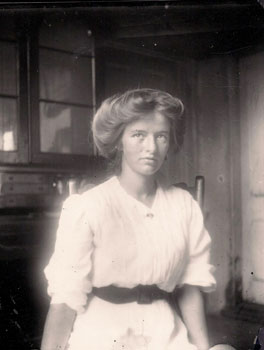 |
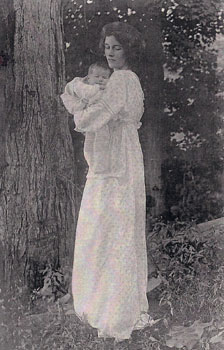 |
| Sister
Barbara, 1916. |
Agnes with
baby Barbara, named for her Aunt Barbara, 1914. |
At Dawn Hill there were summer days filled with
contentment. As well as the family from Jersey, Agnes had several
friends from New York who came to visit. Harry Kemp, the poet, and Mary
Pyne, an actress, were frequent visitors.
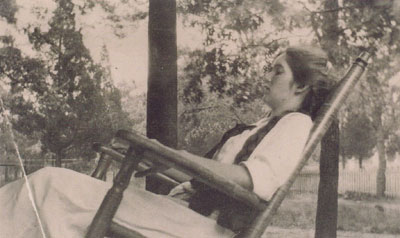 |
| Agnes
Boulton at Dawn Hill, 1914-1915. |
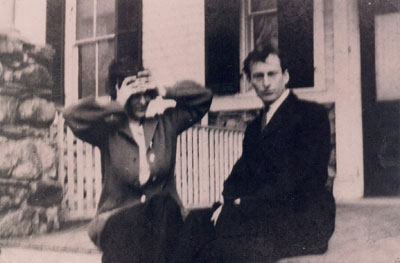 |
| Agnes with
poet Harry Kemp, 1914-1915. |
A pretty and appealing baby, little Barbara thrived. The
family affectionately called her “Cookie.” Cecil stayed on to help with
Cookie while Agnes continued to write, harvested the garden and tried to
keep the small farm productive.
Almost two years passed and it was beginning to prove
difficult trying to support the little family and run a farm. Agnes had
tried and it was not working. So once more, she asked her mother, who
had returned to Jersey, to help out again by coming to stay with little
Barbara while she went into the city to work and write. This seemed the
only way to make ends meet.
Cecil, again packed her bags and took the train up to
Cornwall. Agnes needed her help and the rest of the family were able and
willing, one more time, to care for The Old House, the animals and each
other.
Before Agnes left for New York, she decided to tell her
mother the truth of Cookie’s birth. She had not met anyone in England
and had not married an Army man named Burton. It was a made-up name to
fit the only story she felt able to tell. But she would use Burton for
Barbara’s last name anyway.
The truth was that Agnes had been living in New York and
met a publisher whose name was Cortland Young. She was to work with him
on a story, and learned he was unhappily married and planning a divorce.
The story materialized and so did a long-term affair. In time Agnes
became pregnant and when the baby was due, Young took the responsibility
of purchasing the farmhouse with many acres, which was to become a home
for Agnes and the baby. This solved the mystery for Mother Cecil of
where Aggie had found the money to buy the farm. Many years later, after
Agnes’ divorce from O’Neill, Young wanted Agnes to marry him, but she
had made another life for herself and, though fond of him did not want
to marry. Barbara remembered his visiting when she was a very small
child. After Cortland Young died, his brother sent money to Agnes for
help with Barbara’s clothes and schooling.
All of this remained a mystery, even to Gene O’Neill
when he married Agnes a few years later. Because of this, Barbara
suffered a great deal of pain about it all through her life. Everyone
involved with writing about the years of Gene and Agnes’ marriage tried
to find the truth of the story. Agnes never revealed it to anyone but
her mother, and to little Barbara. Barbara talked to me about it because
I had the same kind of birth with an absent father, and it seemed to
make a bond between us. The young women of the early twenties were
caught up in the new freedoms with smoking, sex and dress, but they
couldn’t shake the Victorian prejudices when it came to an
out-of-wedlock pregnancy. At that time, it became an enormous secret,
painful for those involved.
 Chapter IV
Chapter IV |